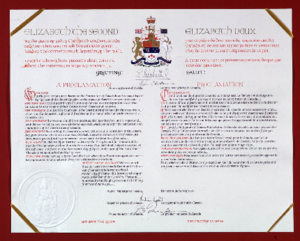Urban legends are not relegated to second-rate movies or the twittersphere. Too often even elected officials and members of the fourth estate succumb to the easy story line. Whether it is because some really don't understand an issue or because they are wedded to the notion that a "six second sound bite" is all anyone can absorb, they perpetuate realities that are simply wrong. As Daniel Patrick Moynihan once quipped, "Everyone is entitled to their own opinion but not to their own facts."
Here in Quebec, every time the word "Constitution" is mentioned it is always around the issue that this province is not a signatory to Canada's central governing piece of legislation. That is simply false. We are in this debate once more since Premier Couillard mentioned several days ago that it would be appropriate if Quebec "signed" on by 2017, the 150th anniversary of Confederation.
Whatever one may think of the timing of Mr. Couillard's comments, their sentiment is noble and necessary. But even he did not explain the issue in full.
Canada's Constitution is the British North America Act that made this northern Dominion a nation. All provinces accepted it and until today operate under its parameters as does the federal government. It divides federal and provincial jurisdictions in secs. 91 and 92 and among other matters protects minority language rights.
What Quebec, under Premier René Levesque, did not acquiesce to was the 1982 Constitution Act. That was an important achievement by Prime Minister Pierre Elliott Trudeau, but perhaps inaptly named. Unfortunately, it is that Act which is always referred to when the question of Quebec's signature comes up as missing from Canada's "Constitution."

The 1982 Act also had one other vital aspect to it, a Charter of Rights and Freedoms that would be embedded in our Constitution. A Bill of Rights for all Canadians. Now this was not Canada's first Bill of Rights. That was actually passed by the Conservative government of Prime Minister John Diefenbaker in the late 1950s. And it was considered a groundbreaking piece of legislation. But because it was not part of our Constitution,it was rarely upheld in the Courts.
The missing Quebec signature on the 1982 Act arose out of the acrimony between the secessionist government of Mr. Levesque and the federalist government of Mr. Trudeau. Levesque was not satisfied that the formula for major Constitutional revisions that requires the consent of at least seven provinces representing fifty per cent of the population would be enough to protect Quebec's interests. He also objected to the blanket protection of individual and minority rights embedded in the Charter. After much wrangling and many federal-provincial Conferences, the unfortunate "Notwithstanding" clause was put into the Charter. Trudeau didn't want it, but was convinced that only with this compromise would Levesque sign. It did not happen. Levesque went home and on a glorious April day Queen Elizabeth put her signature to the Act in Ottawa.
Canada's Constitution stands firm. The only thing Quebec did not sign was an Act of repatriation and amendment. So let's not go into a tailspin when we hear Mr. Couillard mention Quebec signing the 1982 Act. The issues then are not the issues today. They have long since passed. A signature from Quebec might be an appropriate cherry on Canada's 150th birthday cake.

























Comments
Please login to post comments.